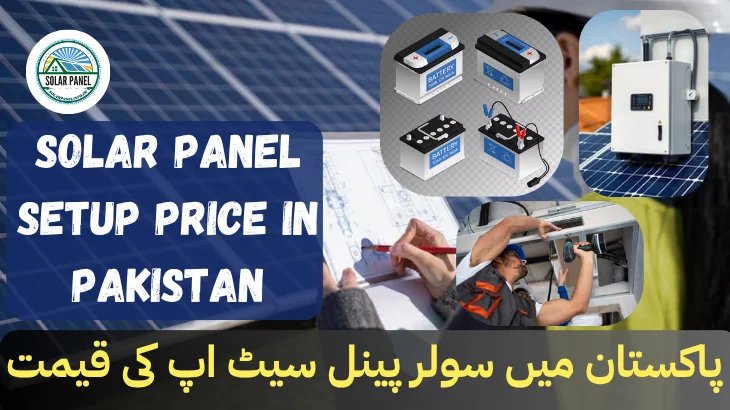Solar Panel Setup Price in Pakistan
To effectively install a comprehensive solar panel system in your home, office, or building, it’s essential first to assess your monthly energy needs. Since electricity usage varies among individuals, the solar setup required will differ accordingly. Begin by reviewing your monthly electricity consumption in units. Once you have this information, you can refer to a guideline or table to identify the appropriate solar system that meets your specific requirements. Here we will discuss the Solar Panel Setup Price in Pakistan.
Read more: 7 kW solar system price in Pakistan

اپنے گھر، دفتر، یا عمارت میں ایک جامع سولر پینل سسٹم کو مؤثر طریقے سے انسٹال کرنے کے لیے، پہلے اپنی ماہانہ توانائی کی ضروریات کا اندازہ لگانا ضروری ہے۔ چونکہ بجلی کا استعمال افراد میں مختلف ہوتا ہے، اس لیے درکار شمسی سیٹ اپ اس کے مطابق مختلف ہوگا۔ یونٹس میں اپنی ماہانہ بجلی کی کھپت کا جائزہ لے کر شروع کریں۔ ایک بار جب آپ کے پاس یہ معلومات ہو جائیں، تو آپ مناسب نظام شمسی کی شناخت کے لیے گائیڈ لائن یا جدول کا حوالہ دے سکتے ہیں جو آپ کی مخصوص ضروریات کو پورا کرتا ہے۔ یہاں ہم پاکستان میں سولر پینل سیٹ اپ کی قیمت پر بات کریں گے۔
Solar System Cost in Pakistan by Monthly Electricity Usage
Here we give the price of a solar system that will be best for your home and business.
| Monthly Electricity Unit | System Power | Total Cost |
|---|---|---|
| 300-350 | 3KW Solar System Pakistan | 500,000 PKR |
| 500-600 | 5 kW Solar System in Pakistan | 800,000 PKR |
| 1100-1200 | 10 kW Solar System in Pakistan | 153,0000 PKR |
| 1700-1800 | 15KW Solar System in Pakistan | 250,0000 PKR |
| 2300-2400 | 20KW Solar System in Pakistan | 3,200,000 PKR |
| 2800-3000 | 25 kW Solar System in Pakistan | 4,300,000 PKR |
| 3500-3600 | 30KW Solar Setup | 5,500,000 PKR |
| 4000-4200 | 35KW Solar Setup | 6,800,000 PKR |
| 70-120 | 1 KW Solar Setup | 200,000 PKR |
| 150-250 | 2KW Solar Setup | 325,000 PKR |
Read more: 35 kW Solar System Price in Pakistan
Benefits of Solar Energy in Pakistan
Pakistan benefits from a significant amount of sunlight year-round, establishing solar energy as a highly suitable energy source. The advantages of utilizing solar energy are numerous:
- Reduced Electricity Bills: By harnessing solar power, individuals can lessen their reliance on grid electricity, leading to lower energy costs.
- Reliable Power Supply: Solar energy provides a consistent power source, particularly in regions that experience frequent load shedding.
- Environmental Benefits: Solar energy is environmentally friendly, generating no greenhouse gas emissions during its operation, thereby contributing to a cleaner atmosphere.
- Long-Term Financial Savings: Although there is an initial investment in solar energy systems, the long-term maintenance costs are relatively low, resulting in substantial savings over time.
Overall, the shift towards solar energy presents significant economic and environmental advantages for Pakistan.
System Capacity and Maximum Load
Users frequently struggle with choosing the right solar panel system, emphasizing the need for education on load management and system capacity. It’s crucial to inform them about the support capacity for different electrical appliances. A load and system capacity table can effectively estimate the load various appliances can handle, aiding users in understanding their system’s capabilities better.
| System Power | System Load Capacity |
| 1 KW Solar Setup | 4 to 5 Fans, 4 to 5 Lights |
| 2KW Solar Setup | LED Lights, Fans, Heating Iron, Washing Machine |
| 3KW Solar Setup | Pump, 1.5 AC, Fans, Lights, Fridge, Washing machine |
| 4KW Solar Setup | 1.5 ton AC, 1 pump, 6 Fans, 10 Lights, Washing machine, Heating iron |
| 5 KW Solar Setup | 1 TV, 1.5 ton AC, Fridge, 5 Fans, 20 Lights, 1 Washing Machine |
| 6KW Solar Setup | 2 (1.5 ton) AC, 10 Fans, 10 Lights |
| 8KW Solar Setup | Heating Iron, Fans, Lights, Fridge, Oven, Washing machine, Water pump, 1.5 ton AC |
| 10KW Solar Panel Setup | 2 TVs, 2 Washing Machines, 2 fridges, 2 (1.5 ton) AC, 8 Fans, 30 LED Lights |
| 15KW Solar Panel Setup | 3 TVs, 2 Washing Machines, 2 fridges, 3 (1.5 ton) ACs, 10 Fans, 35 LED Lights |
| 20KW Solar Panel Setup | 4 TVs, 3 Washing Machines, 3 fridges, 4 A.Cs |
Read more: 20KW Solar System Price In Pakistan
What Are The Requirements For Setup?
If you’re prepared to buy solar panels for your home but lack knowledge about solar costs and installation, review each setup described below to gain a clearer understanding of it.
Important Factors Before Buying a Solar Panel System
The text discusses the use of solar panels for generating electricity from sunlight, highlighting their environmental benefits as they eliminate the need to burn fossil fuels like coal and gas. It emphasizes the importance of knowing what type of solar panel to purchase, as there are five types available: Monocrystalline, Polycrystalline, Thin-film, PERC, and Bifacial solar panels.
Solar Installer Reputation is a 5-key factor to consider before buying a solar panel system:
- Efficiency and Quality
- System Size and Power Output
- Cost and Financing
- Roof Suitability and Shading
Essential Components of a Solar Power System
Inverter انورٹر
When installing solar panels, an inverter is required to convert the DC (direct current) generated by the panels into AC (alternating current) for use in homes. The inverter adjusts the voltage from the solar panels to match typical household voltages, either 120 or 240 volts. It’s important to use a modern inverter with safety features such as overload protection and automatic power off. Additionally, ensure the inverter’s input voltage range aligns with the DC output from the solar panels for a properly functioning power system.
- Solar Wires: These cables are essential for transmitting both direct current (DC) and alternating current (AC) within a solar energy system.
- Solar Attachments: These components facilitate the connection of electricity between the inverter, solar panels, and other system elements, ensuring efficient energy transfer.
- Solar Combiner Boxes: These devices organize and consolidate the outputs from multiple solar panels before directing them to the inverter, optimizing the overall performance of the solar energy system.
Solar Mounting سولر ماؤنٹنگ
To install solar panels effectively, it is important to choose the right type and position them properly for maximum sunlight capture and efficient electricity generation. A mounting system is necessary to ensure the panels are secure and protected from weather conditions.
There are 5 types of mounting systems.
- Tile Roof: If you have a charming tile roof, you might love this type of mount! It not only looks beautiful but is also super durable, making it a great choice for your solar panels.
- Roof Mount: This is the most popular option for installing solar panels. Whether your roof is flat or has a slight angle, a roof mount can do the trick and help you harness solar energy with ease!
- Ground Mount: Have some open land? Ground mounts are perfect for setting up your solar panels right there! It’s a simple solution when you want to take advantage of the space you have.
- Metal Roof: For those with metal rooftops, this common mounting system works wonders! It securely attaches your solar panels while blending in seamlessly with your home’s style.
- Solar Trackers: Want to get the most out of your solar panels? Solar trackers are an amazing option! Unlike other mounts that keep your panels in one spot, solar trackers can rotate and follow the sun, boosting energy production by up to 40%.
Battery بیٹری
Batteries are super important for a solar panel system. During the day, the panels generate energy that needs to be stored in a battery for later use or in case of an emergency. While batteries aren’t necessary for the panels to function, they’re a great backup option. For example, if it’s a cloudy day and the sun isn’t shining, the panels won’t produce any energy. Without a battery, you won’t be able to use that energy later. Plus, having a bigger battery means it can store more energy for you when you need it.
There are four types of batteries used for solar panels.
- Lead Acid Battery
- Lithium Battery
- Nickel-Cadmium Battery
- Flow Battery
Conclusion
Solar panel systems in Pakistan provide a reliable and cost-effective way to meet electricity needs. By assessing monthly energy consumption and choosing the right system size, users can lower electricity bills and maintain a steady power supply during load shedding. Quality components like efficient inverters, proper mounting, and backup batteries enhance the longevity of solar setups. With ample sunlight year-round, transitioning to solar energy promotes sustainability and financial savings in Pakistan.
پاکستان میں سولر پینل سسٹم بجلی کی ضروریات کو پورا کرنے کے لیے ایک قابل اعتماد اور کم خرچ طریقہ فراہم کرتے ہیں۔ ماہانہ توانائی کی کھپت کا اندازہ لگا کر اور سسٹم کا صحیح سائز منتخب کر کے، صارفین بجلی کے بلوں کو کم کر سکتے ہیں اور لوڈ شیڈنگ کے دوران بجلی کی مستقل فراہمی کو برقرار رکھ سکتے ہیں۔ کوالٹی کے اجزاء جیسے موثر انورٹرز، مناسب ماؤنٹنگ، اور بیک اپ بیٹریاں شمسی سیٹ اپ کی لمبی عمر کو بڑھاتی ہیں۔ سال بھر سورج کی روشنی کے ساتھ، شمسی توانائی پر منتقلی پاکستان میں پائیداری اور مالی بچت کو فروغ دیتی ہے۔
FAQ’s
How do I choose the right solar panel system for my home?
Begin by calculating your monthly electricity usage in units and consult a system size guide to determine your needs.
Are solar panels expensive to install in Pakistan?
The initial investment may be high, but solar panels can save money over time by decreasing electricity bills and require minimal maintenance.
Do I need a battery with my solar system?
Batteries are optional, but they are recommended for storing energy during cloudy days or power outages.


